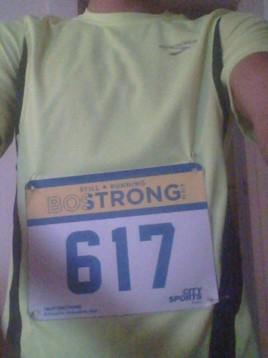- within Intellectual Property topic(s)
- in United States
- with Inhouse Counsel
- with readers working within the Pharmaceuticals & BioTech industries
The phrase "Boston Strong" became a rallying cry for the strength and support Bostonians displayed after an act of terrorism.
In 2013, two brothers planted bombs near the finish line of the Boston Marathon in Copley Square. Three people were killed, and hundreds were injured. Residents of Boston and surrounding neighborhoods were told to stay indoors while a search for the suspects was underway – it was an unsettling time for those of us living in the city. But in the wake of this horrific act, the community rallied. Boston came together to honor those that were lost and injured and salute the first responders that attended to the victims.
Boston Strong became ubiquitous. The phrase was displayed on the Green Monster in Fenway, adorned on flags and banners outside peoples' homes, and featured on clothing and other items. Five days after the bombing, Bostonians took to the streets wearing bibs with the abbreviated phrase "BoStrong" and Boston's 617 area code to show that we would not be intimidated:

The phrase began to function as a sort of motto for the city. But what affect do these uses have on the ability for the phrase to function as a trademark?
In a recent decision from the Trademark Trial and Appeal Board (TTAB), an application to register BOSTON STRONG was refused. In re Franklin Sports, Inc., Application No. 98326109(August 12, 2025). The reason? The phrase doesn't function as a trademark. Instead, it serves as a common message, not a brand.
A company called Franklin Sports, Inc. applied to register BOSTON STRONG for entertainment services like volleyball competitions, sports broadcasting, and ticketing. But the TTAB found that the phrase is too widely used and too deeply embedded in public sentiment to serve as a source identifier.
The TTAB relied on extensive evidence: Boston Strong appears on t-shirts, hats, mugs, stickers, and even at blood drives. It's been used by Boston sports' teams, the Massachusetts State Police, and countless community events. It's everywhere and that's the problem for establishing trademark rights in the phrase.
Under trademark law, a mark must identify the source of goods or services. If a proposed mark is informational, ubiquitous, or otherwise does not act as a source indicator, an application to register the mark may be refused on failure to function grounds. Because Boston Strong is so widely used, it is difficult for the phrase to be associated with a single source. The TTAB compared it to other phrases like "Team Jesus" and "investing in American jobs," which were also denied registration on failure to function grounds because they convey an affiliation with Christianity and promote the manufacture of goods in the United States, respectively.
Franklin Sports argued that media coverage and sports branding could make Boston Strong a recognizable team name, like other Boston sports teams. But the TTAB wasn't convinced. The phrase's deep cultural meaning and widespread use made it incapable of functioning as a trademark.
This decision sends a clear message: you can't own a city's soul. Boston Strong belongs to the people, not a company. It's a reminder that some phrases are bigger than branding—they're part of our collective identity.
We are, Boston Strong.
The content of this article is intended to provide a general guide to the subject matter. Specialist advice should be sought about your specific circumstances.



